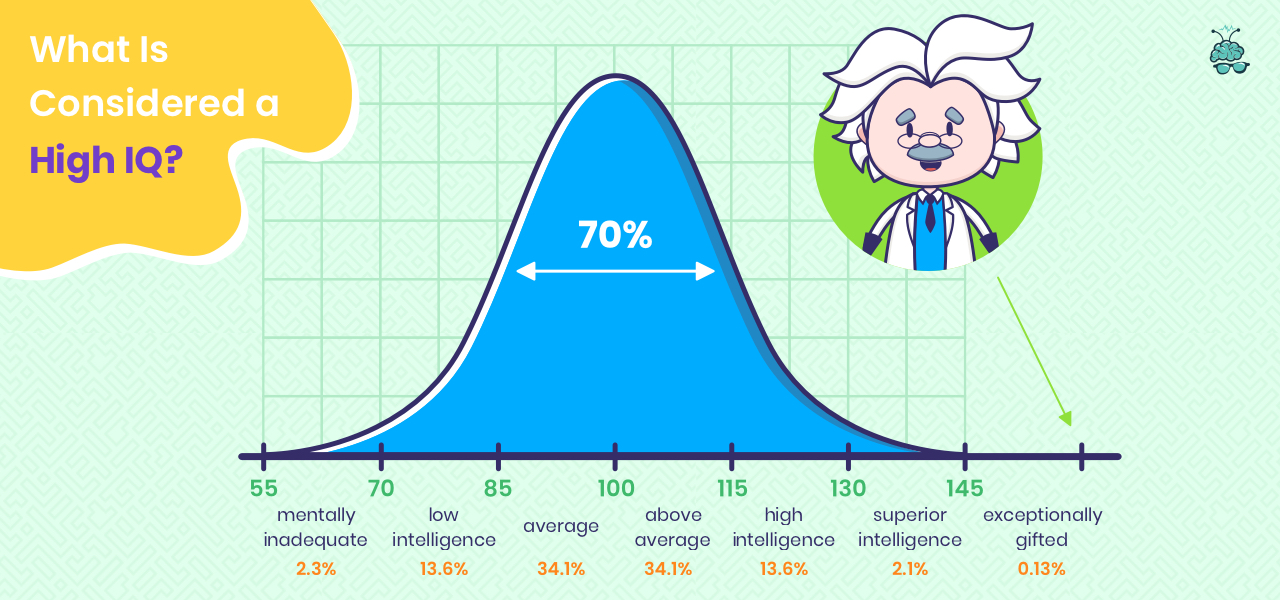High IQ has always been a topic of fascination, sparking curiosity about the nature of intelligence and its implications in our lives. Whether it is about academic performance, career success, or social interactions, the concept of a high IQ influences various aspects of our daily existence. In this article, we will delve into the world of high IQ, exploring what it means, how it is measured, and its impact on individuals and society as a whole.
Throughout history, intelligence has been a critical factor in human development. From the groundbreaking theories of intelligence proposed by psychologists to the modern-day understanding of cognitive abilities, high IQ remains a significant marker of intellectual potential. This article aims to provide a comprehensive overview of high IQ, backed by research and data, to enhance our understanding of this intriguing subject.
As we progress through this article, you will discover various aspects of high IQ, including its measurement, the role of genetics and environment, and how it affects personal and professional life. By the end, we hope to shed light on the complexities of intelligence and encourage thoughtful discussions surrounding high IQ.
Table of Contents
- What is High IQ?
- Measuring IQ: Tests and Scales
- The Role of Genetics and Environment
- Impact of High IQ on Education
- High IQ and Career Success
- Social Relationships and High IQ
- Famous Individuals with High IQ
- Conclusion
What is High IQ?
High IQ, or high intelligence quotient, is commonly defined as a score that significantly exceeds the average IQ score of 100. IQ tests are designed to measure a range of cognitive abilities, including reasoning, problem-solving, and understanding complex ideas.
The classification of IQ scores is generally as follows:
- Below 70: Intellectual Disability
- 70-84: Below Average Intelligence
- 85-114: Average Intelligence
- 115-129: Above Average Intelligence
- 130-144: Gifted
- 145 and above: Highly Gifted
Individuals with an IQ of 130 or higher are often regarded as possessing high intellectual capabilities, which can manifest in various ways across different fields and disciplines.
Measuring IQ: Tests and Scales
Numerous tests exist to measure IQ, each with its unique methodology and focus areas. Some of the most widely recognized IQ tests include:
- Wechsler Adult Intelligence Scale (WAIS)
- Stanford-Binet Intelligence Scales
- Raven's Progressive Matrices
These tests assess various cognitive functions, such as verbal comprehension, working memory, and perceptual reasoning. Generally, the results are standardized to allow for a comparison across different populations.
Limitations of IQ Testing
While IQ tests provide valuable insights into cognitive abilities, they also have limitations:
- They may not capture all aspects of intelligence, such as creativity or emotional intelligence.
- Test performance can be influenced by socio-economic factors and educational background.
- Cultural biases may affect the accuracy of IQ scores across diverse populations.
The Role of Genetics and Environment
Research indicates that both genetics and environment play crucial roles in determining an individual's IQ. According to studies, heritability estimates suggest that genetics account for approximately 50-80% of the variation in IQ scores.
However, the environment also significantly impacts cognitive development. Factors such as education, socio-economic status, nutrition, and access to stimulating experiences contribute to the overall intellectual growth.
The Nature vs. Nurture Debate
The debate surrounding nature versus nurture continues to be a topic of interest in psychology. While genetic predispositions play a role in high IQ, nurturing environments can enhance or inhibit cognitive abilities. Thus, individuals are shaped by both their genetic makeup and environmental influences.
Impact of High IQ on Education
High IQ can greatly influence educational experiences and outcomes. Students with high IQs often show advanced learning abilities, quickly grasping complex concepts and excelling in academic settings.
Educational systems may implement various strategies to support high-IQ students, including:
- Acceleration programs that allow students to progress through the curriculum at an accelerated pace.
- Enrichment programs that provide additional challenges and opportunities for exploration.
- Gifted education programs that cater specifically to the needs of high-IQ students.
High IQ and Career Success
The correlation between high IQ and career success is well-documented. Individuals with high IQs often excel in various fields, including science, technology, engineering, and mathematics (STEM). However, it is essential to recognize that high IQ alone does not guarantee success.
Other factors, such as emotional intelligence, interpersonal skills, and resilience, also contribute to achieving career goals. Nevertheless, high-IQ individuals may have advantages in analytical thinking and problem-solving, which can be beneficial in many professional settings.
Social Relationships and High IQ
High IQ can influence social interactions and relationships. While individuals with high IQs may excel intellectually, they may also face challenges in social situations. The following points highlight the relationship between high IQ and social dynamics:
- High-IQ individuals may have difficulty relating to peers who do not share similar cognitive abilities.
- They may experience feelings of isolation or loneliness due to differences in interests and perspectives.
- Conversely, high-IQ individuals often find camaraderie within like-minded communities, fostering positive relationships.
Famous Individuals with High IQ
Throughout history, many individuals have been recognized for their exceptional intelligence. Here are a few notable figures known for their high IQ:
| Name | IQ Score | Field |
|---|---|---|
| Albert Einstein | 160 | Theoretical Physics |
| Stephen Hawking | 160 | Theoretical Physics |
| Marilyn vos Savant | 228 | Author & Columnist |
| Terence Tao | 225 | Mathematician |
Conclusion
In conclusion, high IQ represents a significant aspect of human intelligence, influencing various facets of life, including education, career, and social relationships. Understanding the nuances of high IQ, its measurement, and the interplay of genetics and environment can provide valuable insights into human potential.
As we continue to explore the complexities of intelligence, let us appreciate the diverse ways in which individuals contribute to society, regardless of their IQ scores. We encourage you to share your thoughts in the comments below and explore more articles on our website to deepen your understanding of this fascinating topic.
Call to Action
For more insightful articles and discussions related to intelligence, psychology, and personal development, feel free to subscribe to our newsletter or share this article with your friends!

:max_bytes(150000):strip_icc()/2795585-article-what-is-a-genius-iq-scoreecf71fe1-aadb-424b-b6ce-9a15002d2fdd-5a56782989eacc003758bb57.png)


